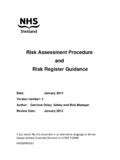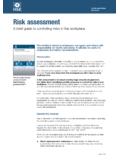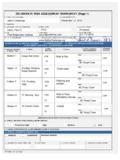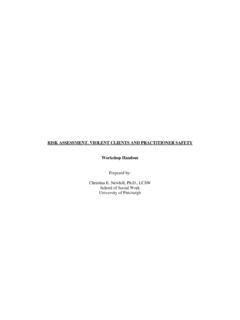Transcription of Safety Planning Guidelines for Event - Auckland …
1 Safety Planning Guidelines for events December 2003 ISBN 0-478-25458-X Produced by the Ministry of Civil Defence & Emergency Management, in conjunction with the New Zealand Police, New Zealand Fire Service, St John Ambulance and local government representatives. These Guidelines are not copyright, and may be reproduced with acknowledgement. These Guidelines , together with the supporting document Safety Planning Guidelines for events : Forms, are available on the website Ministry of Civil Defence & Emergency Management PO Box 5010 Wellington New Zealand Tel: +64 4 473 7363 Fax: +64 4 473 7369 Email: Website: Safety Planning Guidelines for events Page 3 of 54 Acknowledgements Development of Safety Planning Guidelines for events was undertaken in consultation with several agencies.
2 The Guidelines could not have been created without the time and expertise of the following working group: Derek Davidson, Inspector, Operations Planning , Auckland City, NZ Police Terry O Neill, Senior Sergeant, Operations Planning , NZ Police Kerry Stewart, Risk Management Coordinator, NZ Fire Service, Western Fire Region Adam Johnston, Regional events Manager, St John Northern Region Bruce Parkes, Risk Management Coordinator, St John Northern Region Greg Phillips, Service Leader, Emergency Management, Capital Coast Health Erin Kearney, Coordinator Physical Environment Team & Health Protection Officer Regional Public Health, Hutt Valley Health Andy Gifford, Manager.
3 Programmes and Recreation Centres, Wellington City Council Richard Taki, events and Film Facilitation Manager, Auckland City Council Jose Cachemaille, Project Fieldworker, Health Action Trust, Nelson Sara Williams, Project Coordinator, Ministry of Civil Defence & Emergency Management Dave Brunsdon, Director, Kestrel Group This document was prepared by FLAT EARTH Wellington, New Zealand Safety Planning Guidelines for events Page 4 of 54 Contents 1. 6 Purpose of These Guidelines ..6 How to Use These Guidelines ..7 2. The Event Stages.
4 8 What is an Event ? ..8 Event Liaison with all involved parties ..9 3. Event Planning Stage .. 10 Council Approval .. 10 Venue Selection .. 13 Establishing an Event Organising Working Party .. 17 Consultation With Stakeholders and 19 Laws and Regulations Permits and Resource Consents .. 24 4. Event Development Stage .. 27 Internal and External Communications .. 27 Site Map .. 29 Criminal Activities .. 31 Briefings .. 32 Emergency Plans .. 33 5. Managing Your Event .. 35 Health and Safety .. 35 Gate and Door Control .. 35 Crowd Control.
5 36 37 Alcohol .. 38 Street events and 39 Hazardous Materials (Hazmat) .. 40 Food and Water .. 40 Toilets and Hygiene .. 41 Refuse and 42 Signage .. 43 Information Centre/Lost 44 On the 44 6. Post- Event Stage .. 45 Debriefing .. 45 Surveys .. 45 Safety Recommendations .. 45 7. Appendix 1 Special Planning for High Risk events .. 46 Pyrotechnics (Fireworks) .. 46 Powerboat Racing .. 47 Long Distance Road events .. 47 8. Appendix 2 Assessing Risks and 49 9. Risk Assessment Forms for Appendix 2 .. 50 10. References and Sources.
6 53 Safety Planning Guidelines for events Page 5 of 54 Foreword events such as outdoor concerts, sporting events and festivals provide important social and economic highlights for our communities. With the increased focus on health and Safety issues and the advent of new legislation relating to health and Safety , there is renewed focus on Planning for events and a need for Guidelines that will help Event organisers plan a safe Event . This document is intended to provide Guidelines to meeting the requirements and expectations of the various agencies involved in Event organisation at local, regional and national level.
7 It provides a basis for sound Planning for Safety arrangements for these events . In many instances pointers to legal requirements are provided, however the document is not intended as a definitive statement on legal requirements for events . Event organisers should take appropriate advice on such matters. Planning should take place well in advance of the Event and should include all agencies that are involved in, or may be called on to respond to, an emergency. events should be fun for those involved, as well as provide safe environments.
8 The public has an expectation and a right to be safe at all public and private events . Those holding such events have a responsibility to guarantee their attendees the safest environment practicable. These Guidelines are a statement of good practice and have been developed by the Ministry of Civil Defence & Emergency Management, in conjunction with NZ Police, NZ Fire Service, St John Ambulance and local government input. John Norton Director Ministry of Civil Defence & Emergency Management December 2003 Safety Planning Guidelines for events Page 6 of 54 1.
9 Introduction Throughout New Zealand, at any given time of year, there are festivals, concerts, fairs, sporting events , and many other events that gather, or have the potential to gather, large crowds. Under normal conditions, these events proceed with little or no problems. However, when something goes wrong, either as the result of a natural hazard or a man-made hazard, then local emergency management and emergency agencies become involved, and there can be serious consequences for Event organisers and councils.
10 Many people contribute significantly to the success of a public Event . While these Guidelines are written primarily for Event organisers, it is essential that they are also distributed to managers, public and private organisations, emergency service personnel, local government agencies, and any individual or organisation that contributes to the Planning of events . Purpose of These Guidelines Safety Planning Guidelines for events is intended to assist Event organisers, who are actively involved in or considering running events in New Zealand, to deliver well-planned, safe events .









